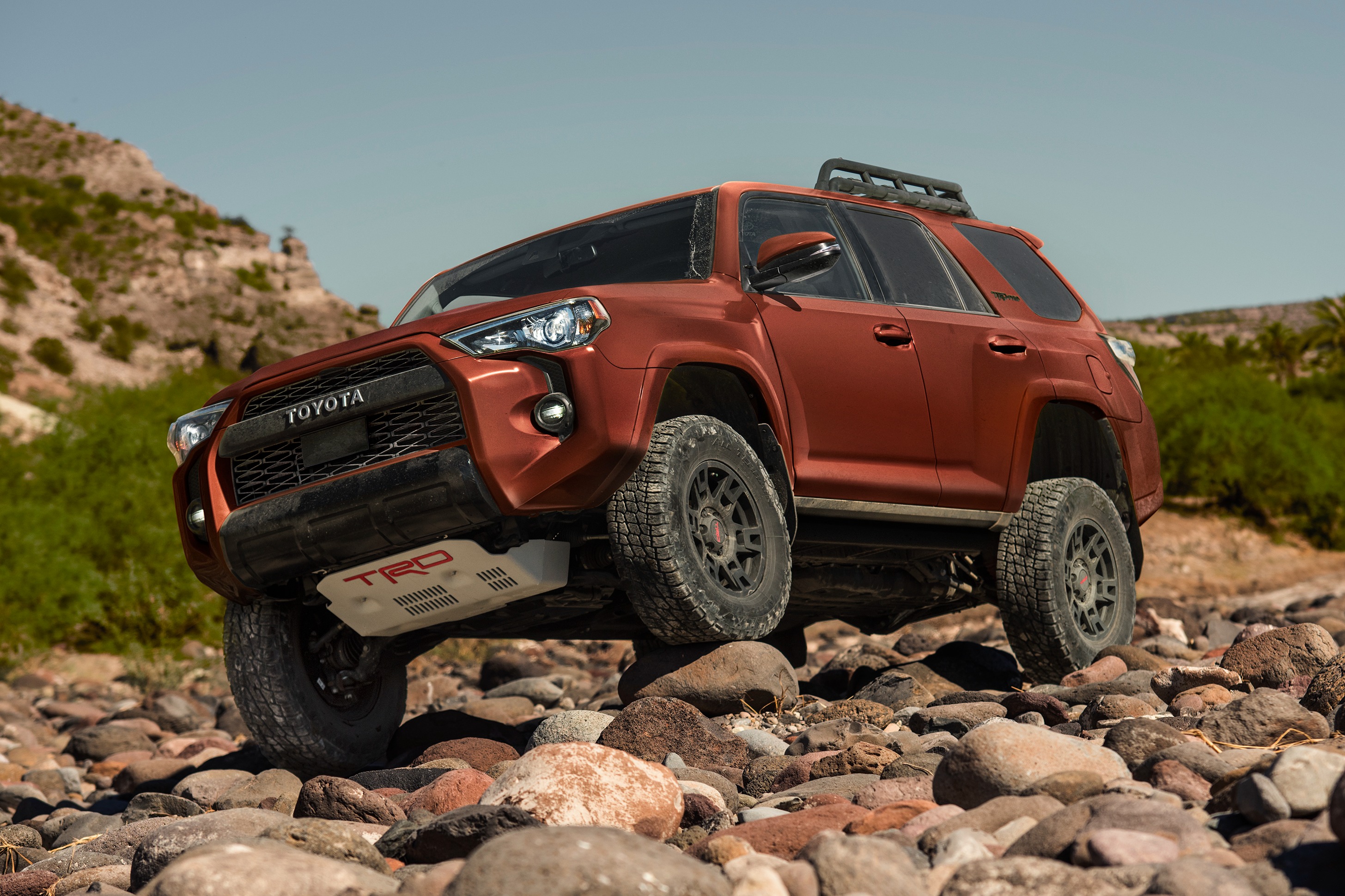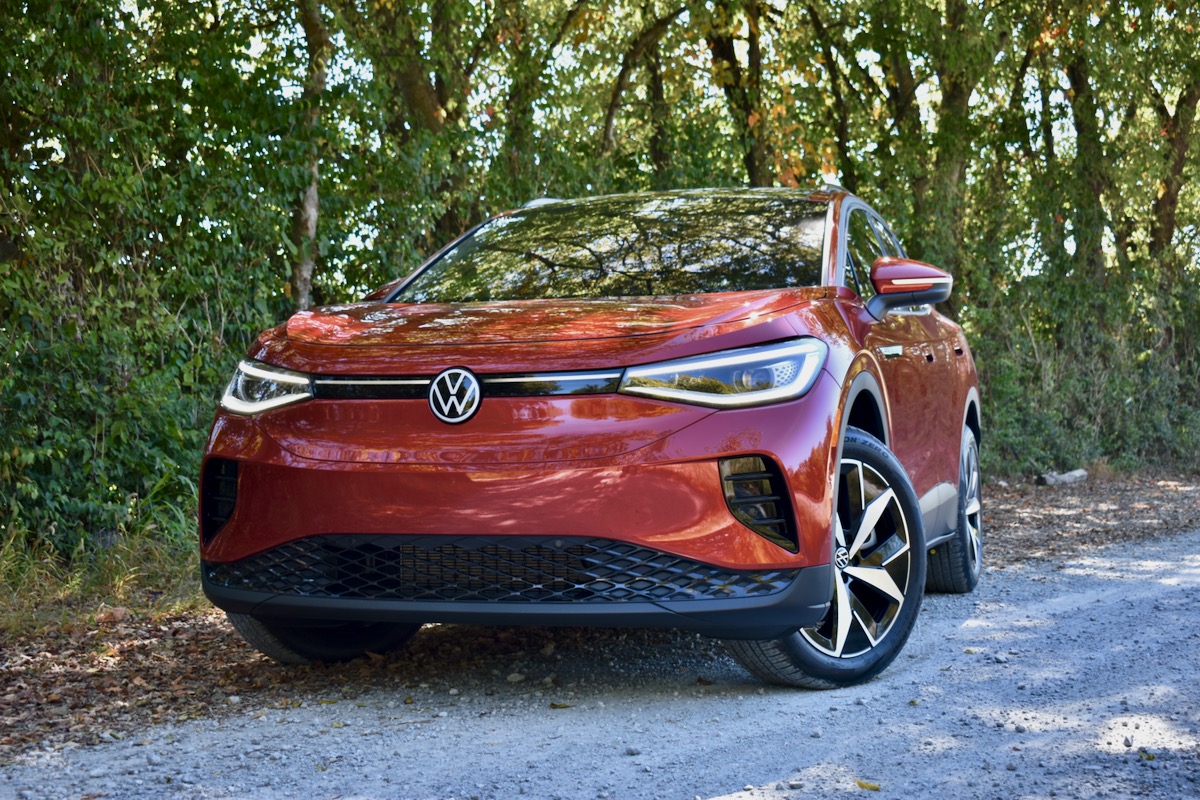Toyota 4Runner vs Volkswagen ID.4
Overview | |
MSRP$41,270 | MSRP$39,735 |
Listings9228 | Listings2601 |
Ratings & Reviews | |
User Reviews | User Reviews |
Expert reviews7.7 out of 10 | Expert reviews7.5 out of 10 |
Pros
Cons
| Pros
Cons
|
Reviews SummaryAfter a very long 15 years, we finally got a new Toyota 4Runner with more capabilities, power, comfort, and technology. It's also more efficient thanks to a new hybrid option and more composed on pavement, but it remains a solid all-terrain vehicle to extend your adventures further. Verdict: Toyota doesn't throw out the fomula with its newly redesigned 4Runner. Instead, the 2025 model keeps many of the features shoppers have loved for over a decade, while also adding a more contemporary selection of four-cylinder powertrains. | |
Reviews SummaryThanks to a new, more powerful rear-drive motor, increased driving range to nearly 300 miles, a next-generation infotainment system with substantial user-experience improvements, and a handful of comfort and convenience upgrades, the 2024 Volkswagen ID.4 is a better electric SUV than before. However, it no longer includes complimentary DC fast charging for three years. Instead, you get up to 500 kWh of free charging, after which you’ll pay to play. Verdict: While the downgrade in free charging is a bummer, the updated 2024 Volkswagen ID.4 is not. With the technology better sorted, improved comfort, an impressive sound system, and more power, performance, and range, VeeDub’s electric SUV need not make apologies. | |
No video found | |
Popular Features & Specs | |
Engine | Engine201 hp Electric |
Drive Train | Drive TrainRWD |
Seating Capacity7 | Seating Capacity5 |
EV Battery Capacity | EV Battery Capacity62 kWh |
MPG City | MPG City115 |
MPG Highway | MPG Highway98 |
Battery Charge Time (120V) | Battery Charge Time (120V)65 hours |
Battery Charge Time (240V) | Battery Charge Time (240V)6.25 hours |
Engine | |
Engine Name2.4L 278 hp I4 | Engine Name201 hp Electric |
Torque317 lb-ft @ 1700 rpm | Torque |
Horsepower278 hp @ 6000 rpm | Horsepower |
Battery Charge Time (120V) | Battery Charge Time (120V)65 hours |
Battery Charge Time (240V) | Battery Charge Time (240V)6.25 hours |
Drivetrain4X2 | DrivetrainRWD |
Fuel Economy | |
EV Battery Capacity | EV Battery Capacity62 kWh |
MPG City | MPG City115 |
MPG Highway | MPG Highway98 |
Interior | |
Seating Capacity7 | Seating Capacity5 |
Key Features | |
Navigation System | Navigation SystemStandard |
Safety | |
Front Crash Overall4 | Front Crash Overall5 |
Side Crash Overall5 | Side Crash Overall5 |
Dimensions & Capacity | |
Cargo Space48.4 cu ft | Cargo Space30.3 cu ft |
Curb Weight4455 lbs | Curb Weight4308 lbs |
Height72.6 in | Height64.5 in |
Length194.9 in | Length180.5 in |
Width78.0 in | Width83.0 in |
Wheelbase112.2 in | Wheelbase108.9 in |
Maximum Payload895 lbs | Maximum Payload981 lbs |
Number of doors4 | Number of doors4 |
Maximum Towing Capacity6000 lbs | Maximum Towing Capacity2200 lbs |
Standard Towing Capacity6000 lbs | Standard Towing Capacity |
Overview | ||
MSRP | $41,270 | $39,735 |
Listings | ||
Ratings & Reviews | ||
User reviews | ||
Expert reviews | 7.7 out of 10Read full review | 7.5 out of 10Read full review |
Pros & cons | Pros
Cons
| Pros
Cons
|
Summary | After a very long 15 years, we finally got a new Toyota 4Runner with more capabilities, power, comfort, and technology. It's also more efficient thanks to a new hybrid option and more composed on pavement, but it remains a solid all-terrain vehicle to extend your adventures further. Verdict: Toyota doesn't throw out the fomula with its newly redesigned 4Runner. Instead, the 2025 model keeps many of the features shoppers have loved for over a decade, while also adding a more contemporary selection of four-cylinder powertrains. | Thanks to a new, more powerful rear-drive motor, increased driving range to nearly 300 miles, a next-generation infotainment system with substantial user-experience improvements, and a handful of comfort and convenience upgrades, the 2024 Volkswagen ID.4 is a better electric SUV than before. However, it no longer includes complimentary DC fast charging for three years. Instead, you get up to 500 kWh of free charging, after which you’ll pay to play. Verdict: While the downgrade in free charging is a bummer, the updated 2024 Volkswagen ID.4 is not. With the technology better sorted, improved comfort, an impressive sound system, and more power, performance, and range, VeeDub’s electric SUV need not make apologies. |
Video | No video found | |
Popular Features & Specs | ||
Engine | 201 hp Electric | |
Drive Train | RWD | |
Seating Capacity | 7 | 5 |
EV Battery Capacity | 62 kWh | |
MPG City | 115 | |
MPG Highway | 98 | |
Battery Charge Time (120V) | 65 hours | |
Battery Charge Time (240V) | 6.25 hours | |
Engine | ||
Engine Name | 2.4L 278 hp I4 | 201 hp Electric |
Torque | 317 lb-ft @ 1700 rpm | |
Horsepower | 278 hp @ 6000 rpm | |
Battery Charge Time (120V) | 65 hours | |
Battery Charge Time (240V) | 6.25 hours | |
Drivetrain | 4X2 | RWD |
Fuel Economy | ||
EV Battery Capacity | 62 kWh | |
MPG City | 115 | |
MPG Highway | 98 | |
Interior | ||
Seating Capacity | 7 | 5 |
Key Features | ||
Navigation System | Standard | |
Safety | ||
Front Crash Overall | 4 | 5 |
Side Crash Overall | 5 | 5 |
Dimensions & Capacity | ||
Cargo Space | 48.4 cu ft | 30.3 cu ft |
Curb Weight | 4455 lbs | 4308 lbs |
Height | 72.6 in | 64.5 in |
Length | 194.9 in | 180.5 in |
Width | 78.0 in | 83.0 in |
Wheelbase | 112.2 in | 108.9 in |
Maximum Payload | 895 lbs | 981 lbs |
Number of doors | 4 | 4 |
Maximum Towing Capacity | 6000 lbs | 2200 lbs |
Standard Towing Capacity | 6000 lbs | |

By: CarGurus + AI
At CarGurus, our team of experienced automotive writers remain at the heart of our content operation, conducting hands-on car tests and writing insightful guides that are backed by years of industry experience. To complement this, we are harnessing AI to make our content offering more diverse and more helpful to shoppers than ever. To achieve this, our AI systems are based exclusively on CarGurus content, ratings and data, so that what we produce is both unique to CarGurus, and uniquely helpful to car shoppers.







































